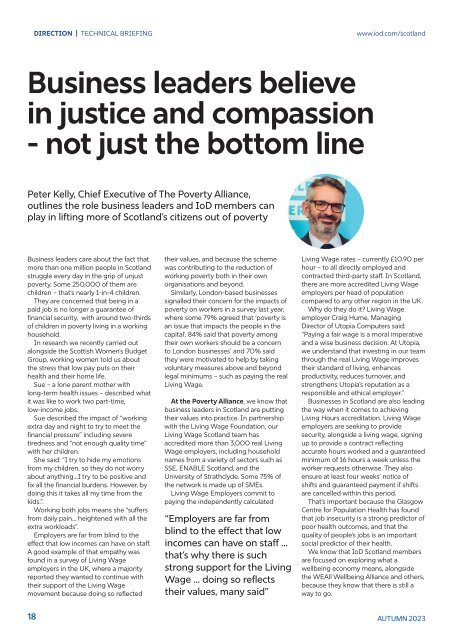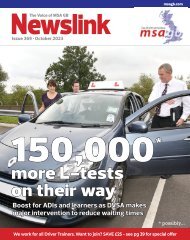Direction Autumn 2023 - IoD Scotland members magazine
Business advice, information. IoD events. Directors' technical briefings
Business advice, information. IoD events. Directors' technical briefings
You also want an ePaper? Increase the reach of your titles
YUMPU automatically turns print PDFs into web optimized ePapers that Google loves.
DIRECTION | TECHNICAL BRIEFING<br />
www.iod.com/scotland<br />
Business leaders believe<br />
in justice and compassion<br />
- not just the bottom line<br />
Peter Kelly, Chief Executive of The Poverty Alliance,<br />
outlines the role business leaders and <strong>IoD</strong> <strong>members</strong> can<br />
play in lifting more of <strong>Scotland</strong>’s citizens out of poverty<br />
Business leaders care about the fact that<br />
more than one million people in <strong>Scotland</strong><br />
struggle every day in the grip of unjust<br />
poverty. Some 250,000 of them are<br />
children – that’s nearly 1-in-4 children.<br />
They are concerned that being in a<br />
paid job is no longer a guarantee of<br />
financial security, with around two-thirds<br />
of children in poverty living in a working<br />
household.<br />
In research we recently carried out<br />
alongside the Scottish Women’s Budget<br />
Group, working women told us about<br />
the stress that low pay puts on their<br />
health and their home life.<br />
Sue – a lone parent mother with<br />
long-term health issues – described what<br />
it was like to work two part-time,<br />
low-income jobs.<br />
Sue described the impact of “working<br />
extra day and night to try to meet the<br />
financial pressure” including severe<br />
tiredness and “not enough quality time”<br />
with her children.<br />
She said: “I try to hide my emotions<br />
from my children, so they do not worry<br />
about anything...I try to be positive and<br />
fix all the financial burdens. However, by<br />
doing this it takes all my time from the<br />
kids.”.<br />
Working both jobs means she “suffers<br />
from daily pain... heightened with all the<br />
extra workloads”.<br />
Employers are far from blind to the<br />
effect that low incomes can have on staff.<br />
A good example of that empathy was<br />
found in a survey of Living Wage<br />
employers in the UK, where a majority<br />
reported they wanted to continue with<br />
their support of the Living Wage<br />
movement because doing so reflected<br />
their values, and because the scheme<br />
was contributing to the reduction of<br />
working poverty both in their own<br />
organisations and beyond.<br />
Similarly, London-based businesses<br />
signalled their concern for the impacts of<br />
poverty on workers in a survey last year,<br />
where some 79% agreed that ‘poverty is<br />
an issue that impacts the people in the<br />
capital’, 84% said that poverty among<br />
their own workers should be a concern<br />
to London businesses’ and 70% said<br />
they were motivated to help by taking<br />
voluntary measures above and beyond<br />
legal minimums – such as paying the real<br />
Living Wage.<br />
At the Poverty Alliance, we know that<br />
business leaders in <strong>Scotland</strong> are putting<br />
their values into practice. In partnership<br />
with the Living Wage Foundation, our<br />
Living Wage <strong>Scotland</strong> team has<br />
accredited more than 3,000 real Living<br />
Wage employers, including household<br />
names from a variety of sectors such as<br />
SSE, ENABLE <strong>Scotland</strong>, and the<br />
University of Strathclyde. Some 75% of<br />
the network is made up of SMEs.<br />
Living Wage Employers commit to<br />
paying the independently calculated<br />
“Employers are far from<br />
blind to the effect that low<br />
incomes can have on staff ...<br />
that’s why there is such<br />
strong support for the Living<br />
Wage ... doing so reflects<br />
their values, many said”<br />
Living Wage rates – currently £10.90 per<br />
hour – to all directly employed and<br />
contracted third-party staff. In <strong>Scotland</strong>,<br />
there are more accredited Living Wage<br />
employers per head of population<br />
compared to any other region in the UK.<br />
Why do they do it? Living Wage<br />
employer Craig Hume, Managing<br />
Director of Utopia Computers said:<br />
“Paying a fair wage is a moral imperative<br />
and a wise business decision. At Utopia,<br />
we understand that investing in our team<br />
through the real Living Wage improves<br />
their standard of living, enhances<br />
productivity, reduces turnover, and<br />
strengthens Utopia’s reputation as a<br />
responsible and ethical employer.”<br />
Businesses in <strong>Scotland</strong> are also leading<br />
the way when it comes to achieving<br />
Living Hours accreditation. Living Wage<br />
employers are seeking to provide<br />
security, alongside a living wage, signing<br />
up to provide a contract reflecting<br />
accurate hours worked and a guaranteed<br />
minimum of 16 hours a week unless the<br />
worker requests otherwise. They also<br />
ensure at least four weeks’ notice of<br />
shifts and guaranteed payment if shifts<br />
are cancelled within this period.<br />
That’s important because the Glasgow<br />
Centre for Population Health has found<br />
that job insecurity is a strong predictor of<br />
poor health outcomes, and that the<br />
quality of people’s jobs is an important<br />
social predictor of their health.<br />
We know that <strong>IoD</strong> <strong>Scotland</strong> <strong>members</strong><br />
are focused on exploring what a<br />
wellbeing economy means, alongside<br />
the WEAll Wellbeing Alliance and others,<br />
because they know that there is still a<br />
way to go.<br />
18 AUTUMN <strong>2023</strong>

















